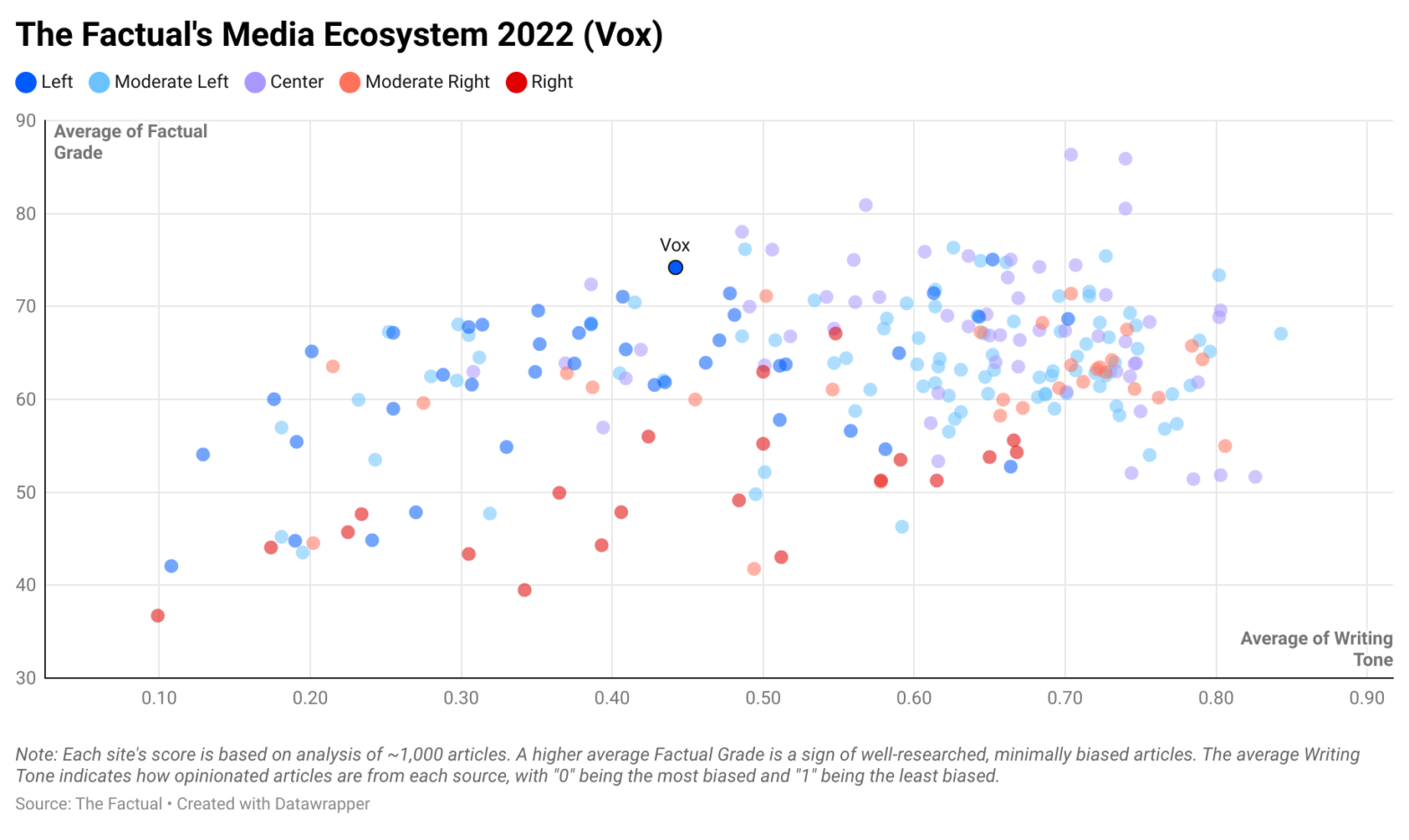In 2014, Ezra Klein, today a columnist for the New York Times and formerly an editor for the Washington Post, created Vox as a place for “explanatory journalism.” The site produces a wide range of journalism but is subject to accusations of considerable liberal bias. This leads us to ask two important questions: how factual is Vox and how biased is it?
How Does The Factual Rate News Sources?
The Factual analyzes more than 10,000 news stories every day to help readers find the most informative, least-biased articles. Our news-rating algorithm scores each article along four metrics: (1) cited sources and quotes, (2) publication history, (3) writing tone, and (4) author expertise. These scores combine in a weighted average we call a Factual Grade, which ranges from 0–100%. (See our How It Works page to learn more about our algorithm.)
For this study, we analyzed ~1,000 articles each from 240 news sources. The average Factual Grade for the entire dataset was 62.5%. Based on these averages, we can compare the performance of news sites across the media ecosystem. The entire dataset can be explored in greater detail here.
How Factual Is Vox?
Vox scored an average Factual Grade of 74.2%, placing it in the 92nd percentile of our dataset. In fact, Vox scores in the top 20 news sources that we analyzed
These high scores are partially explained by Vox’s explanatory approach to journalism, which involves the inclusion of extensive supporting evidence. This means articles commonly include links to numerous high-quality sources. Moreover, Vox has beat reporters who regularly recover the same topics, leading to high author expertise scores. However, the scores are driven downwards by opinionated language (see below).
Like any news source, scores for articles from Vox varied widely based on factors like author expertise and cited evidence. For example, some scored above 90%, while others scored below 50%.
Please check your email for instructions to ensure that the newsletter arrives in your inbox tomorrow.
How Opinionated Is Vox?
One of the metrics The Factual uses is the Writing Tone, which measures how opinionated the writing is in an article. For this metric, the algorithm looks for signs of subjective commentary (e.g., first person pronouns and unnecessary adverbs), as well as the emotional nature of selected words, and sees how prevalent they are for a given length of text. More neutral text receives higher ratings, with “0” being the most opinionated and “1” being the most neutral.
Vox had an average Writing Tone score of 0.44, placing it in the 26th percentile in our dataset. This suggests that despite the high overall scores for articles from Vox, many articles are written in an opinionated tone. This can be seen in headlines such as “The January 6 hearings showed why it’s reasonable to call Trump a fascist” and “How conservatism conquered America, and corrupted itself.”
How Biased Is Vox?
Together, assessments from media bias organizations indicate tThe Factual classifies news sites by political bias as either Left, Moderate Left, Center, Moderate Right, or Right. This classification comes from third-party assessments from media bias organizations such as AllSides and Media Bias/Fact Check (MBFC). Based on this data, The Factual assigns Vox a Left bias.
AllSides gives Vox a “Left” bias, based on the most recent editorial review and over 44,508 community ratings. Vox was classified as “Lean Left” prior to February 2018. Vox “writes favorably about Left-leaning policies and never includes a Right-leaning perspective,” according to AllSides’ editorial team. The editors note that such a one-sided approach “prevents readers from getting a holistic understanding” of major issues. Moreover, this approach leads articles to blur the lines between news and opinion.
Media Bias/Fact Check (MBFC) corroborates this classification, rating Vox as having a “Left” bias. This is due to “wording and story selection that routinely favors the left,” according to MBFC. Vox gets credit for “Mostly Factual” reporting, due to two failed fact-checks in the past, both related to Trump policies. Overall, however, Vox gets credit for using high-quality sources.
Vox’s left-leaning bias is plainly clear to most observers, as the site advocates progressive perspectives and produced numerous articles that were firmly anti-Trump. The site also at times uses titles with emotionally loaded language, such as “Photos of Trump’s reckless activities, ranked by their Covid-19 risk” and “The frightening implications of a federal court’s latest immigration opinion.” In the past, Vox has taken action to address extreme instances, such as when it suspended an editor in 2016 over tweets encouraging anti-Trump riots.
Please check your email for instructions to ensure that the newsletter arrives in your inbox tomorrow.
Who Owns Vox?
Vox is owned by Vox Media, a company established in 2011 to encompass SB Nation and The Verge. Today, the company owns other publications such as Eater, Polygon, and New York Magazine. The right-leaning project Influence Watch has pointed out that much of Vox Media’s leadership has held positions in Democratic administrations and campaigns, which helps explain the outlet’s left-leaning orientation.
How to Mitigate Bias
News articles are bound to have bias because all authors have some frame of reference within which they describe a story. Political bias ratings are helpful in understanding this framing. However, it can be more beneficial to know how factual an article is based on quantifiable metrics that can be seen across the media ecosystem, such as cited evidence, author expertise, and writing tone. This is what The Factual ascertains.
Reading several, highly rated articles from across the political spectrum helps counter the bias of any news source or story. To have the day’s most factual news stories delivered to your inbox every morning, subscribe to our daily newsletter.
Article updated on September 22, 2022 to reflect new data.

